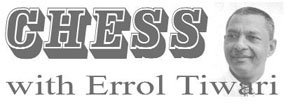It is better to concentrate on a game of chess than play a “there it is shoot it” game. Chess is an antidote to the relentless rise of video games.
– Malcolm Pein, International Chess Master and CEO of the British charity Chess in Schools and Communities

Now chess is making a dramatic comeback in primary schools following its disappearance 30 years ago. Academics are agreed that the ‘game of kings’’ is an essential ingredient for stimulating pupils’ concentration and improving their reasoning and problem-solving skills. It also enhances their memory, reading and mathematical abilities. Finally, chess helps youngsters to learn sportsmanship. The ancient pastime has traditionally been seen as a ‘posh’ game played by knights, bishops and kings. That may be so, and I feel flattered to be associated with the game of kings, but on a serious note, chess has been remarkably visible in some deprived areas of Georgetown.
Pein calls the CSC programme “a breakthrough”, as “today’s children hardly ever play board games with their parents. We used to play monopoly, ludo, all sorts of games. But today it’s just computer and video games.”
Hopefully the introduction of chess in primary schools would influence the existing mindset both in Guyana and abroad. One of the wonderful aspects of chess is the ability to do calculations while you are playing. You are not even aware you are doing maths effortlessly and without a care in the world when you are thinking of giving up rook for a knight; or sacrificing the queen for an unassailable position.
Chess is already a part of the school curriculum in some countries. In Armenia for example, chess is compulsory in schools. Levon Aronian is Armenian and he is currently competing in the Candidates Super Tournament in London to find a challenger for world champion Viswanathan Anand.
In Strasbourg, the European Parliament endorsed the ‘Chess in Schools’ programme. Wherever you go, the game of chess represents a role of pride and influence in the world. It remains a game of prestige.
Although it is, one of the primary aims of this column is to exorcise the myth that chess is an upper to middle-class game. We want all to be involved. Moreover, the popularity of chess is slowly encircling the globe. We, as chess players, feel the passion to excel as in football, cricket, rugby and boxing. We feel the passion.





